シーホース
三河 /
柏木 真介
SEAHORSES MIKAWA / Shinsuke Kashiwagi
For all young athletes, not just me
Demonstrating grit and determination as a team captain
August 25, 2023
![Professional basketball player [Shinsuke Kashiwagi]](/ito-sports-project/assets/img/interview/010/pct_mv.webp)
Interview: Masafumi Mikawa / Photos: Shinichi Shimazaki
I started playing basketball because it looked interesting.
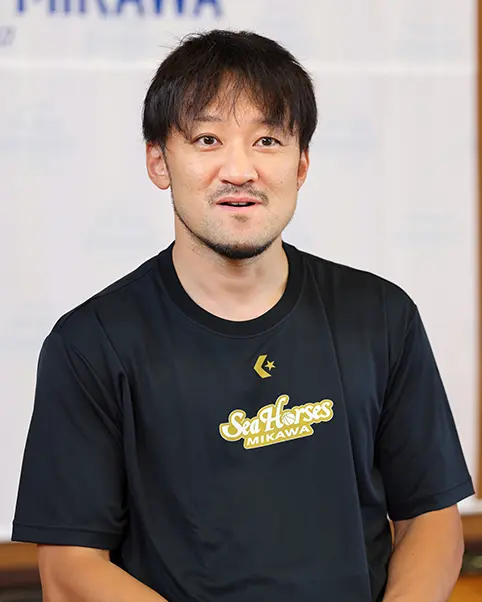
- ITO: What inspired you to start playing basketball, and to advance to a competitive level?
-
Kashiwagi: I started playing basketball around the third grade, after I went to my cousin's practice. I was playing baseball and soccer at the time, but around then, the mini-basketball youth team, which had been restricted to fourth graders and older, started accepting third graders. So I joined the team.
When I got started, all the players looked so cheerful. My first impression was that basketball was a fun and interesting game. But once I actually joined the team, the practices turned out to be pretty rigorous. I didn't realize it then, but looking back, I see those practice sessions were pretty tough for elementary school students. But I didn't mind, because it was so much fun, so I kept playing.
-
I really came to understand just how interesting basketball can be the first time I appeared in an actual game. I’ve always been pretty competitive. I always wanted to get into the game, to be a regular member of the team, and to win. At first, I just wanted to have fun. But once I was chosen for the team, accepted to a strong high school program, and selected to the national team for my age category, I got motivated. I wanted to keep getting better.
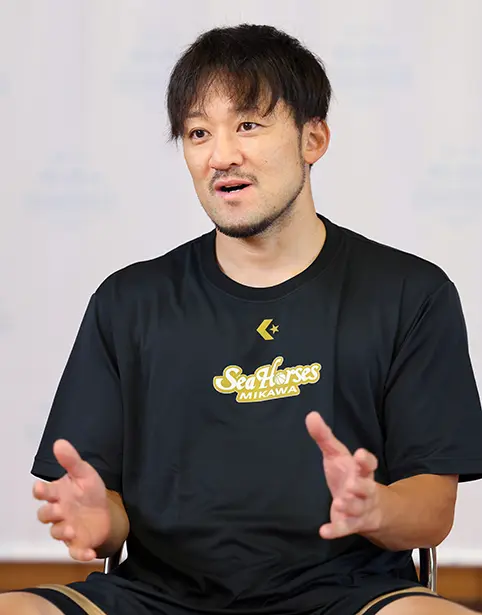
- ITO: From the time you started playing in the third grade to now, was there ever a time you wanted to quit?
-
Kashiwagi: I've wanted to quit competitive play countless times. I'm from Hokkaido, which is large and has lots of athletes. In the Hokkaido selection process, numerous players met to compete for just 12 spots. I still remember the feeling of disappointment when I was unsuccessful at the end of the process. Luckily, I was chosen for the team the next time I got a chance, thanks to the support of my teachers and teammates. That experience was a shock. Up to that point, everything had gone so smoothly. I’d been chosen to the regional team and even named its captain.
My high school had a strong program. I was surrounded by top players. I wasn’t myself one of the best players in Hokkaido, so I figured it would be great if I competed as hard as I could till I graduated. I didn’t have much more ambition. I was chosen for the team in my first year of high school—but, honestly, I wanted to go home a number of times.
Conscious preparation and care are essential.
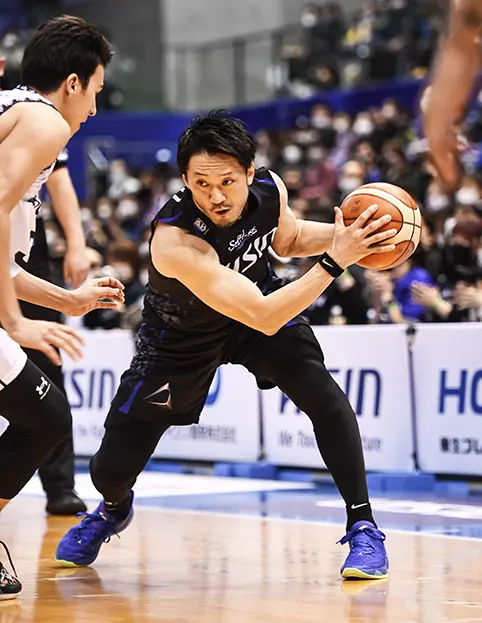
©SeaHorses MIKAWA Co.,Ltd.
- ITO: But you didn’t give up. You became a professional basketball player. What's your game and practice schedule like now?
-
Kashiwagi: The season starts in October and goes through the Golden Week holidays in early May. If we make it to the championships, we keep playing to about the end of May. Then we get June and July off. I start practicing on my own in the latter part of July, then join full practice sessions in August.
I often play golf on my days off. I used to just go along when elder teammates invited me to play. But, recently, I found I’ve fallen in love with golf. A lot of other players are getting into golf now. It's surprisingly good training. It’s a workout, and you use your core. Constantly running in all directions uses up your energy. When I was on the national team, we were cooped up in group training about one week after the season ended. Now, I enjoy my time off to the fullest.
-
I practice daily for 90 minutes to two hours, or about three hours, including strength training. I try not to overdo it and to concentrate on quality practice. But I'm 42 years old. That’s pretty old for a basketball player. My preparation, care, and practice habits have changed a lot from when I was young. I still work hard during practice. But I also try to set aside enough time for preparations and care.
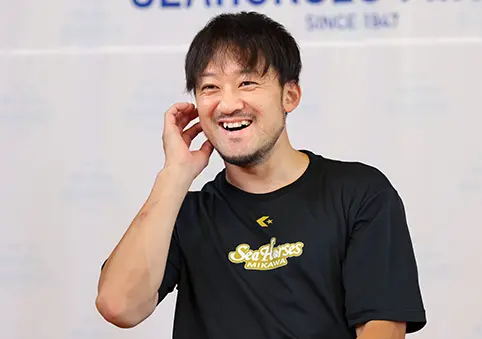
- ITO: How do you manage your physical condition? Are there any specific things you have in mind?
-
Kashiwagi: I'm careful about diet and sleep. I always try to eat a balanced diet, and during the season I focus on carbohydrates. I consume lots of carbohydrates and protein before a game, but sometimes I won't eat very much on the next day.
I sleep at least 10 hours a day. I go to sleep at about 9:00, sometimes with my children, after I get them to fall asleep. [laughing] My wife helps during the season to make sure I get enough sleep and eat right.
Trying to find the ideal conditioning method
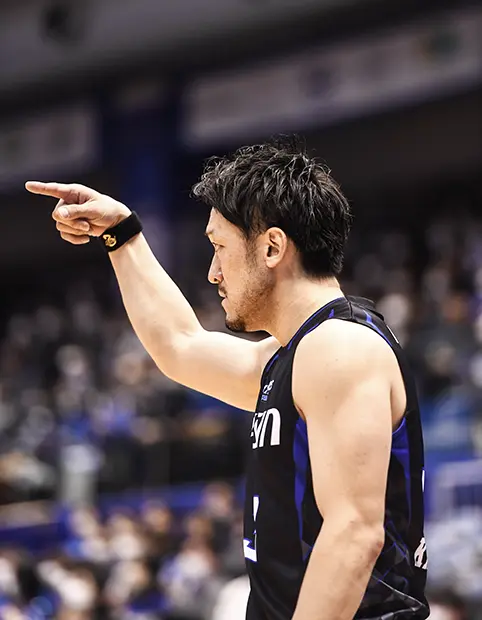
©SeaHorses MIKAWA Co.,Ltd.
- ITO: Are there any things you think are especially important about conditioning? Or points you'd like young athletes to pay attention to?
-
Kashiwagi: When I was young, I was in good shape and was happy with how I performed, including during games. So I didn't think much about conditioning. I was OK practicing a lot every day.
But as I got older, I found it hard to shed a sense of fatigue. It's important to play in my best shape, and training, care, and the right preparations have become more important. I wish I’d started my current practice regimen when I was young.But I also think focusing too much on conditioning when you’re young can lead to burnout. I’ve gone through several cycles of trying to find what works for me by trying out various things, then applying what I learned.
-
Younger athletes often ask about diet, care, and when and how often to take supplements. We have professional trainers. But sometimes I’m asked what kind of core training is best. Some players even watch and imitate what I do. But just because I do something doesn’t mean I would recommend it to others. It might not work for them. It's not necessarily a bad thing to imitate another athlete, but in doing so, each athlete has to consider their own needs and find what works for them.
My treatment device helps me practice without injury.
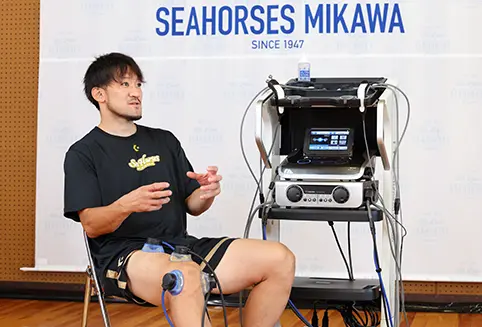
- ITO: When did you first start using a treatment device?
-
Kashiwagi: My therapist and trainer first had me use one when I was injured. I had been a member of the national team since my early twenties, and it was regular practice to use a treatment device for care. Mostly, I use an ultrasound treatment device. I have a compact device I bought for personal use. There’s a wide range of treatment devices, including low frequency and microcurrent devices. I use whatever works for my physical condition or injury.
-
In my thirties, I injured my meniscus. That injury seemed a little dangerous, so I started to learn about the body and therapy. Since then, my care methods have changed quite a bit. I started to think about what I needed for my future selfcare.
- ITO: So you have your own treatment device? How exactly do you use it?
-
Kashiwagi: Basically, I use my treatment device every day. I use it before practice and training and on game days right after I wake up. I use it when cooling down after a game. My knees and other joints become painful fairly often, but it's just due to putting so much strain on the muscles, and not a problem with the joints themselves. So I try to use the treatment device to really warm up my joints before practice or a game.
Basically, my trainer handles it. But I set up the ultrasound treatment device myself for warming my knees before practice. You have to apply the device to different parts of the knee in different ways. That's why I have my trainer check things. In the past, I usually got treatment after an injury, but for the past few years I’ve been using the treatment device from the preparation stage.
I often look up care methods on the Internet. Other athletes rely on a wide range of methods in this area. It's natural to be interested in what they’re doing. I refer to their practices for useful information, then try to put into practice what I can do myself.
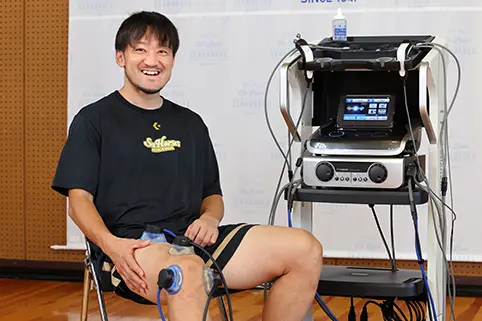
- ITO: So you research care methods yourself? When did you start taking this interest in care?
-
Kashiwagi: My knees start to hurt when they get tired, but if I use a treatment device before practice, practices tend to start more smoothly. Before, my knees often hurt when I didn't warm up before practice. That's why I'm especially alert to aspects of care before practice.
-
I left SeaHorses MIKAWA once to play for another team. When I came back, I was almost 40 years old. The volume of practice I could manage was completely different. This was about four or five years ago. I’ve been super vigilant about care since then.
There are many younger players on the team, and I have to play alongside them. I was told I could control the volume of practice in my way, but I thought it would be unfair to my teammates if I didn’t practice in the same way they did. Practice is rigorous and entails a significant physical burden, and even if practice goes well one day, the fatigue and joint pain can carry over to the next morning, in proportion to how much you practice.
I devote as much time as I can to preparation and care so I can do my best as a member of the team. If I couldn’t do that, I’d consider retiring.
Persevering to win as a team
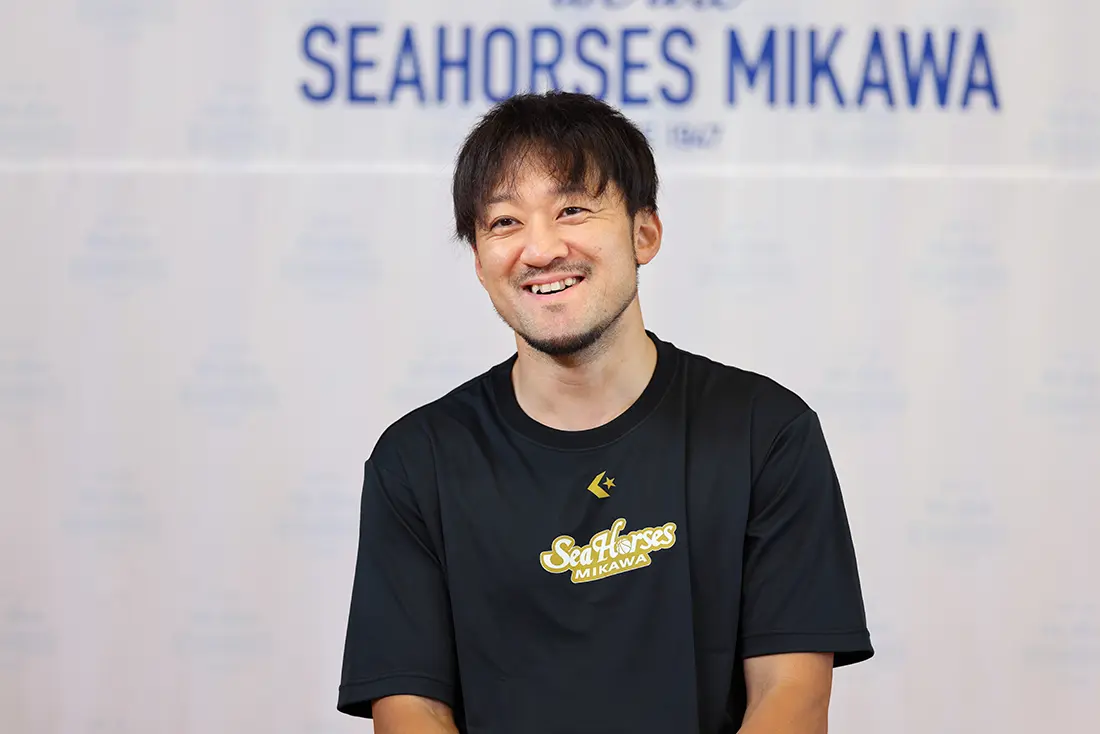
- ITO: Seeing you practice so hard as team captain must inspire your teammates. What future goals do you have for your training every day?
-
Kashiwagi: I don't have personal goals, like winning a personal title or being selected to the national team. Right now, I want us to win as a team. I’m much more interested in helping younger players.
Of course, as an athlete, I need to maintain my performance in the actual games. But my play now is based on doing what I can for the team. It's easy to give advice, but if I didn’t actually follow it myself, what kind of example would that set?
I don’t think I need to do anything new. The best course is just to keep doing what I’ve been doing. Having said that, just continuing to do what you’ve been doing isn’t necessarily easy. Perseverance is essential, and it isn’t just good for me; it helps the players around me.
![Professional basketball player [Shinsuke Kashiwagi]](/ito-sports-project/assets/img/interview/010/pct_bio.webp)
Born December 22, 1981 in Hokkaido.
Began playing basketball in the third grade; went on to compete across Japan at the elementary school level and above; joined the HITACHI SUNROCKERS after graduating from college. Won the Rookie of the Year and Steel Awards and was named to the All-Star team in his first year; named to the Japan national team.
Concluded a pro contract with the AISIN SeaHorses (now SeaHorses MIKAWA) in 2006.
Named to the FIBA Basketball World Cup 2006 national team; ranked in the all-Japan top five in 2007-2010, 2012, and 2013.
Returned to SeaHorses MIKAWA in 2020 after a three-year absence. Named team captain in the 2022-2023 season.
